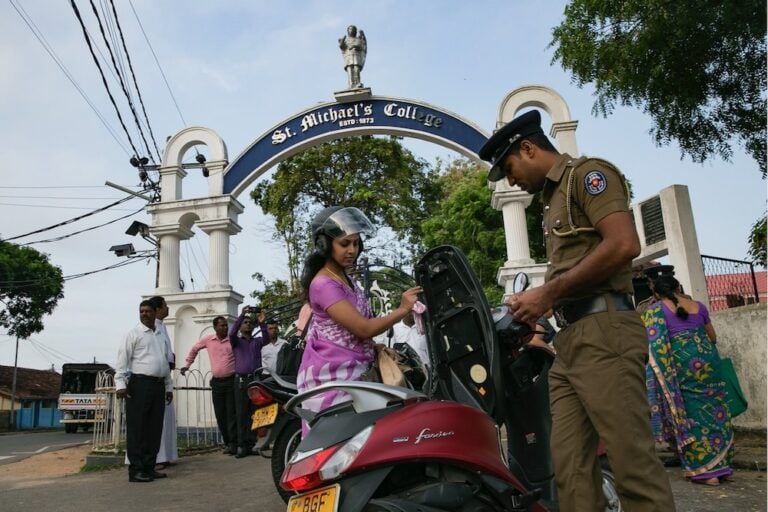(FMM/IFEX) – The following is an FMM press release: Police spokesperson singles out FMM convenor for undue criticism Our attention has been drawn to a letter written by the police media spokesperson and senior superintendent of police, Mr. Ranjith Gunasekera, addressed to the chairman and news director of Sirasa News, dated 11 August 2008. Gunasekera’s […]
(FMM/IFEX) – The following is an FMM press release:
Police spokesperson singles out FMM convenor for undue criticism
Our attention has been drawn to a letter written by the police media spokesperson and senior superintendent of police, Mr. Ranjith Gunasekera, addressed to the chairman and news director of Sirasa News, dated 11 August 2008. Gunasekera’s main complaint is that he has been subject to disrepute by the reportage of media organisations’ views expressed during public protests against Minister Silva’s conduct, in which it has been contended that Gunasekera had no basic conception or understanding of democracy. The letter unfortunately also contains two contumelious references by name to Mr. Uvindu Kurukulasuriya, the Convenor of the FMM, although he has not been copied on the letter.
While Gunasekera is perfectly within his rights to write a letter of complaint against what he sees as unfair reportage of his comments as the official police spokesperson, the instant letter is cause for serious concern on several points, to the extent it makes reference by name to Kurukulasuriya. These references are made in the context of an extended and polemical political argument by Gunasekera about the exercise of the democratic freedoms of expression, association, assembly and protest, against the backdrop of the war against the LTTE (Liberation Tigers of Tamil Eelam).
In brief, Gunasekera’s argument is that, firstly, protests organised by Kurukulasuriya in Colombo on various occasions against media suppression, are an abusive exercise of the fundamental rights guaranteed by Article 14 of the Constitution in a manner that hinders the free exercise by others of their rights to freedom of movement. According to Gunasekera, this is indirectly an obstruction of the economic progress of the country.
Secondly, in what has become a tiresomely repetitive theme of official spokespersons of the government in the recent past, Gunasekera argues that if Kurukulasuriya’s desire was to endear himself to the general public, he should have done something useful to strengthen the armed forces and police led by the President in their fight against the LTTE. The clear implication is that Kurukulasuriya’s activities tend to favour the LTTE.
FMM categorically states that all media protests are organised by a collective of five media organizations and not by any individual. FMM is afraid that making FMM convenor the target of the police spokesperson’s undue criticism may make him vulnerable to another attack by anti-media groups. FMM notes once again the fact that direct or implied threats of this nature have all too often been the ominous precursors of far more unpleasant consequences for media professionals who have attracted such unwelcome attention.
FMM believes that Gunasekera has in this instance exceeded his legitimate right of reply by indulging in unseemly personal contumely. In order to sustain his otherwise untenable argument, he has also been impelled to give a peculiarly idiosyncratic interpretation to Article 14 of the Constitution, as well as engage in political arguments about the prosecution of the war, which is beyond both his official remit and, it seems, his competence. Gunasekera has thereby unwittingly added credence to the original issue of contention about his basic comprehension of democracy, or lack thereof.
Article 14 of the Constitution guarantees to every citizen, inter alia, the fundamental rights of the freedom of expression, association and peaceful assembly. It is inherent in these rights that the freedom of political protest is both a legitimate and necessary element of the democratic way of life, something the Supreme Court has repeatedly affirmed in such celebrated judgments as the Jana Ghosha Case. This truth is so self-evident that we find it incredible that we have to repeat it here in response to Gunasekera’s attempts at constitutional interpretation, as part of which he claims that engaging in disciplined and peaceful protest is an obstruction of the rights of others. His astonishing claim – that organised protest against what has become a wholly unacceptable and pervasive culture of physical attacks and intimidation against the media, and against impunity for publicly-known perpetrators, are detrimental to the economic development of the country – is scarcely more plausible.
FMM finds it deeply regrettable that Gunasekera has, in this instance, demonstrated an overdeveloped sensitivity to legitimate criticism, as well as a confusion of the public interest that he is enjoined by law to uphold with that of the government of the day, and that these errors in his judgment have resulted in him indulging in a vituperative personal attack on Kurukulasuriya, in a letter addressed to a third party, in a manner that is utterly unworthy of a public officer of the law. FMM therefore calls upon Gunasekera, in his capacity as police spokesperson, to retract these statements and to desist from such verbal attacks in the future.
FMM reiterates its call for the immediate implementation of the Seventeenth Amendment to the Constitution, so that the independence, integrity and competence of the Police Department can be established in a manner that ensures that police officers comport themselves and exercise their lawful duties in conformity with the public interest under the rule of law. FMM firmly believes that only the prompt re-establishment of a genuinely independent National Police Commission,appointed on the recommendations of the Constitutional Council (itself to be reconstituted), will free the Police Department from the shackles of politicisation that presently reduce even senior police officers to obsequiousness before governments of the day, and which is plainly at the root of Gunasekera’s unnecessary and most unfortunate missive.


